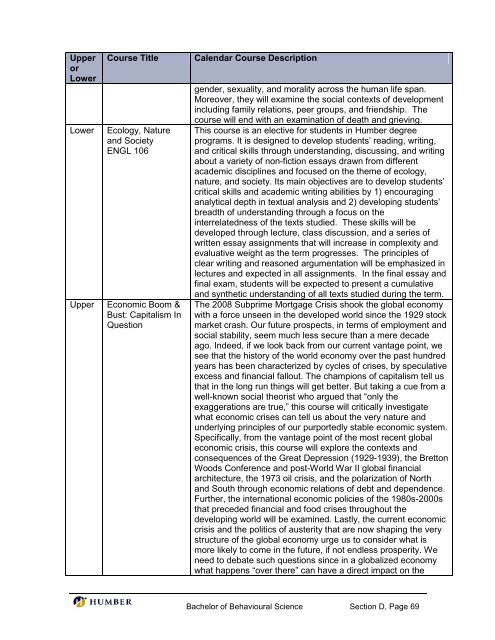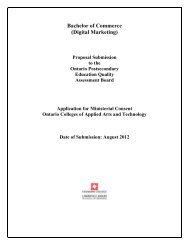Bachelor of Behavioural Science - Postsecondary Education Quality ...
Bachelor of Behavioural Science - Postsecondary Education Quality ...
Bachelor of Behavioural Science - Postsecondary Education Quality ...
Create successful ePaper yourself
Turn your PDF publications into a flip-book with our unique Google optimized e-Paper software.
Upper<br />
or<br />
Lower<br />
Lower<br />
Upper<br />
Course Title<br />
Ecology, Nature<br />
and Society<br />
ENGL 106<br />
Economic Boom &<br />
Bust: Capitalism In<br />
Question<br />
Calendar Course Description<br />
gender, sexuality, and morality across the human life span.<br />
Moreover, they will examine the social contexts <strong>of</strong> development<br />
including family relations, peer groups, and friendship. The<br />
course will end with an examination <strong>of</strong> death and grieving.<br />
This course is an elective for students in Humber degree<br />
programs. It is designed to develop students‘ reading, writing,<br />
and critical skills through understanding, discussing, and writing<br />
about a variety <strong>of</strong> non-fiction essays drawn from different<br />
academic disciplines and focused on the theme <strong>of</strong> ecology,<br />
nature, and society. Its main objectives are to develop students‘<br />
critical skills and academic writing abilities by 1) encouraging<br />
analytical depth in textual analysis and 2) developing students‘<br />
breadth <strong>of</strong> understanding through a focus on the<br />
interrelatedness <strong>of</strong> the texts studied. These skills will be<br />
developed through lecture, class discussion, and a series <strong>of</strong><br />
written essay assignments that will increase in complexity and<br />
evaluative weight as the term progresses. The principles <strong>of</strong><br />
clear writing and reasoned argumentation will be emphasized in<br />
lectures and expected in all assignments. In the final essay and<br />
final exam, students will be expected to present a cumulative<br />
and synthetic understanding <strong>of</strong> all texts studied during the term.<br />
The 2008 Subprime Mortgage Crisis shook the global economy<br />
with a force unseen in the developed world since the 1929 stock<br />
market crash. Our future prospects, in terms <strong>of</strong> employment and<br />
social stability, seem much less secure than a mere decade<br />
ago. Indeed, if we look back from our current vantage point, we<br />
see that the history <strong>of</strong> the world economy over the past hundred<br />
years has been characterized by cycles <strong>of</strong> crises, by speculative<br />
excess and financial fallout. The champions <strong>of</strong> capitalism tell us<br />
that in the long run things will get better. But taking a cue from a<br />
well-known social theorist who argued that ―only the<br />
exaggerations are true,‖ this course will critically investigate<br />
what economic crises can tell us about the very nature and<br />
underlying principles <strong>of</strong> our purportedly stable economic system.<br />
Specifically, from the vantage point <strong>of</strong> the most recent global<br />
economic crisis, this course will explore the contexts and<br />
consequences <strong>of</strong> the Great Depression (1929-1939), the Bretton<br />
Woods Conference and post-World War II global financial<br />
architecture, the 1973 oil crisis, and the polarization <strong>of</strong> North<br />
and South through economic relations <strong>of</strong> debt and dependence.<br />
Further, the international economic policies <strong>of</strong> the 1980s-2000s<br />
that preceded financial and food crises throughout the<br />
developing world will be examined. Lastly, the current economic<br />
crisis and the politics <strong>of</strong> austerity that are now shaping the very<br />
structure <strong>of</strong> the global economy urge us to consider what is<br />
more likely to come in the future, if not endless prosperity. We<br />
need to debate such questions since in a globalized economy<br />
what happens ―over there‖ can have a direct impact on the<br />
<strong>Bachelor</strong> <strong>of</strong> <strong>Behavioural</strong> <strong>Science</strong> Section D, Page 69
















